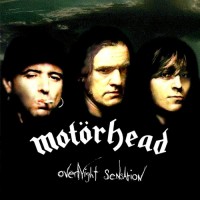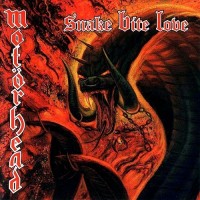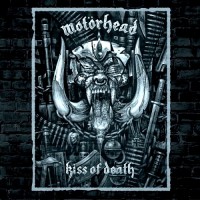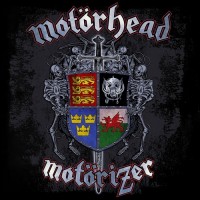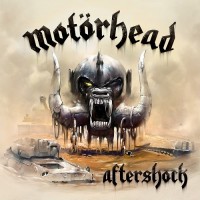Getting Into: Motörhead: Part 3

| Written by: | omne metallum |
| Published: | January 18, 2021 |
Given the band were dealing with the final line-up change of their career, reverting back to a three-piece for the first time in thirteen years, it is to be expected that there would be some teething problems on the album that would come to be Overnight Sensation. Seeing as the band had been plugging away with diminishing returns, the album would signal the start of a mini-wilderness era for the band; they were still producing records of decent quality, but the 90's had caught up with them.
Released right in the barren earth that was the 90's for bands who had formed before Motörhead became a four-piece, the album had a low-key release to say the least. Credit where credit is due, however, the band pick up the pieces from where they had left off with Brian Robertson and stick to their guns (unsurprising given the reputation that "all Motörhead albums sound the same"). While it gave the band forward momentum and showed that the band need not look to slow down or stop, the band stood their ground as the world moved on around them.
Overnight Sensation is a somewhat half-hearted effort by the band that manages to work; it is an enjoyable effort but not one that will move the dial much either way. Songs like "Eat The Gun" and "Them Not Me" typify the record, songs that are far from the band's best work and like a facsimile of what a Motörhead track should be. The rest of the album has similar issues, with songs like "Murder Show" featuring riffs or vocal patterns the band has used before, while in the case of "Shake The World", ones that just are not that interesting, truth be told. The flipside is that some of these half-hearted efforts still endure and are fun if and when you decide to give them the chance. "Civil War", "I Don't Believe A Word" and "Love Can't Buy You Money" are the highlights of the record for me; even as the band stumbled, they could at least be counted on for a good few tracks that will give you that much-needed shot in the arm.While much of the 90's is pushed towards the back of the cupboard when it comes to the band's career (some of it deserved), Snake Bite Love shows that you often throw the good out with the bad when making sweeping gestures such as that. The band have gone on to say that the record was rushed and not given much time to grow naturally; luckily for them, they appear to be a band that thrive on being under the gun.
As if you ever needed evidence that Motörhead marched to the beat of their own drum, then consider that in the midst of nu metal (this being 1998) the band decided to release an album with the rock 'n' roll elements pushed to the fore more than they had been in years. Songs like "Desperate For You", "Don't Lie To Me" and the title track see the band put greater focus on an element of their sound that had largely been overlooked in their recent releases. The band were tinkering at the edges throughout the album, from the left-field intricate drum pattern of "Assassin", the organ on "Take The Blame" or the morose and stripped-back introduction to "Dead And Gone". Whether most albums by the band start out this way and they are smoothed out with time, or the band had a spurt of creativity, I don't know, but it does help form a strong identity for the record alongside the rock 'n' roll tracks, helping it stick out in the band's discography.
Yes, the album does have its fair share of clunkers, with tracks like "Night Side" sounding like the most basic and derivative version of themselves put to tape. Taken together with tracks like "Dogs Of War", the lack of time comes through the speakers and makes for a uneven listening experience, with some big pot holes littered throughout the running order. Overall, it is an album that is overlooked and never really given a fair shake by many; while it will never usurp the positions the band's more recognisable material occupy, it will give you far more material to listen to and will serve up several surprises.We Are Motörhead has managed to attract a reputation as being a return to form for the band, a sense of turning a corner and being on the upswing once again. Unfortunately, I find both of these ideas to be misleading (you will find out about the latter soon), giving the album an undeserved pass on many of its flaws. A mixed bag between run-of-the-mill material and some questionable production leaves the album as one that rarely rises beyond average quality. The drum sound on tracks like "See Me Burning" or "Stay Out Of Jail" is very flat and weak, thudding limply rather than booming or pushing the tracks ahead, sounding like Dee's drums are being microphoned from across the room and as a result bleeding a lot of the power out in the process. Lemmy's bass is quite low in the mix by the band's usual standards, which contributes to the somewhat hollow sound that permeates this album, with Campbell's guitar seemingly the focal point of the mix. When paired with material like "Stay Out Of Jail" that has potential, it ends up weighing against the track and dragging it down rather than elevating it.
With that said, however, you could do worse than pick up and deafen yourself to the songs that make up We Are Motörhead. There are some tracks here that will add to the burgeoning list of songs that constitute your list of good Motörhead songs. "One More Fucking Time" is a unique addition to the band's history, being the longest track the band would produce. The song itself is a good ballad and a refreshing palette cleanser towards the end of the album. It is quickly followed by the punky energy burst that is "Stagefright/Crash And Burn", which suddenly feels more vital than otherwise it would have been if not for the preceding track. While the title track may not be the most original idea in the band's catalogue, I'll be damned if I don't feel a surge of adrenaline when that distinctive bass riff kicks off.
Sure, you will have fun with this album and I try to find the positives with each album I hear; however, the narrative that this is the lone high point between Sacrifice and Inferno will leave you with a false impression and one that will lead you to overlook some great work by the band in this time period, especially if you listen to this album alone and skip the rest assuming this is the best of the period.The bright new dawn that many saw We Are Motörhead signalling turned out to be very short lived once Hammered came out. Sixteen albums in and this is only the third album by the band that I can say gathers dust in-between playthroughs; while I don't like the album, I can at least give them the benefit of the doubt at this stage of their career. Listening to a band like Motörhead is like being an adrenaline junkie: you live for those moments where your blood is coursing through your veins, aided on by the sounds that are violently shaking your ear drums. Unfortunately, Hammered just doesn't do this for me. The band are so stuck in middle gear throughout the album that you would assume that the band were in autopilot mode, going through the motions with little in the way of inspiration to really grip anyone involved in this album (including the listener) and make them pay attention.
The production is well formed but aids the overarching feeling of malaise that permeates this record; everything sounds clean and audible, but my bones are not rattled by Lemmy's in your face bass, nor has Dee's drumming kicked me clean in the gut either. While I can hear and appreciate what both are playing, that connection with feeling is never established and it is hard to immerse yourself in the tracks. There are moments that stick out more than others and come closest to evoking a positive reaction, namely "Brave New World" and "Shut Your Mouth", although they pale when compared to the rest of the band's work. Although none of the songs are clangers, none really rise far beyond passable either, which is the key problem here.
What the album is probably best remembered for is the inclusion of Triple H's entrance theme "The Game" on special additions of the album. Given the track is so seared into my brain and is automatically associated as his entrance theme I can't judge the track on its own merits, but I will say I enjoy it. Had the track appeared on the regular version of the album, then it would have been a boon, as it is the most memorable thing around this time period for the band.Inferno marks the end of the wilderness period of the band, seeing Motörhead return to the throne they had long earned years ago and boy, do they do it in style. Inferno is the band's most self-assured and hard-hitting album in the better part of a decade, and one that is rightly seen as the turning point and start of the glory ride that would see out the band's career.
Inferno has an overarching metallic sound, with sharp and cutting guitars that are matched in both tone and prominence with the bass; add Dee bringing an extra bit of power from his days prior to joining the band, and you have an album so unashamedly in your face that you can feel Snaggletooth's breath on your skin. From the opening "Terminal Show" through "In The Black", you have an opening salvo that will melt the skin off your face and wash away any lingering doubts you may have had after the past few years. You are treated to an eight-track run of songs (that features "In The Name Of Tragedy" to boot) that smacks of Motörhead at their best and sees the band find their mojo once more.
While the album may be their heaviest since Sacrifice, it is not solely a metal affair, with the band's more rock 'n' roll efforts being equally as solid; tracks like "Life's A Bitch" and "Down On Me" are some of the best of their kind since Snake Bite Love. The heavier low-end focus of the production makes these songs more hard rock 'n' roll, but they are no less compelling and stand up tall. The blues aspect of the band's sound is not neglected either, with perhaps two of their strongest (and one of the most surprising) offerings in a few years. "Suicide" is a strong slab of the dirty hard blues the band had served up for years, while "Whorehouse Blues" is a more traditional acoustic blues number, which is perhaps the biggest surprise of the album. Both are equally strong, though I imagine the rarity factor is what puts the latter track in the spotlight more (though it is not undeserved). "Smiling Like A Killer" and "Fight" do admittedly smack of filler, but such is the extent of the weighted ratio between solid and weak that their inclusion doesn't detract much from the overall album. Other than those two songs, there isn't really much Inferno does wrong.Following up an album that was as good as Inferno was always going to be an uphill battle; when you consider Kiss Of Death not only had to live up to it but was the eighteenth release by the band, it does well and is a remarkable effort, though one that does fall slightly short. Solidifying the comeback and renewal of a band that never gave up, Kiss Of Death is a 'take no prisoners' and uncompromising statement from a band that just kept plugging away regardless of who or what was the flavour of the month.
Although it would be easy to fall into the trap of calling this Inferno 2: Electric Boogaloo and clocking out early, it would be a disservice to an album that can stand tall on its own, with songs like "Sucker", "Trigger" and "Living In The Past" setting out the album's stall early. Breaking up proceedings and acting like the lightning rod in the middle is "God Was Never On Your Side", a hell of a broadside from the band. It is a slow orchestral-tinged ballad that was one of the most damning critiques of organised religion that they had put to tape. Marry the orchestral sound of tracks like "1916" with the balladry of "Don't Let Daddy Kiss Me" and you end up with a track that sticks out and immediately gets stuck in your mind. Kiss Of Death's main fault really is that while it has some solid classics, it also has its fair share of good but not great tracks, which, coupled with the start-stop nature of the running order, makes for an uneven listen. Tracks like "Sword Of Glory", "Going Down" and "Devil I Know" have solid ideas but either lack a spark or are one or two ideas short of becoming a great track.
Sitting neatly in between two of the brightest moments of the band's third decade, Kiss Of Death is an album that like Bomber is overlooked through no real fault of its own: certainly one to track down and listen to on its own merits rather than treating as the stepping stone between two great releases.The latter-day renaissance for the band hit its peak with 2008's Motörizer, matching the metallic bend of the prior two releases with a greater focus on the band's main ethos, that being playing a dirty and loud version of rock 'n' roll. While the albums this side of the millennium had mostly been of high quality, it was with the release of Motörizer that you came to the realization that the band could still give their early days a real run for their money consistently, and it wasn't a lucky one-off.
Kicking off in style with the take no prisoners rocker "Runaround Man", the album ticks the boxes that you would expect from a Motörhead record, doing so with style and conviction. Featuring a latter-day semi-hit in "Rock Out", the album contains a slew of tracks that prove that the band are not living off of former glories, with the likes of "Teach You How To Sing The Blues", "The Thousand Names Of God", "English Rose" and "When The Eagle Screams" offering a solid and thoroughly enjoyable listening experience. Pushing the more metallic numbers to the front of the album was a small detail that pays dividends and accentuates the material overall. Starting off hard and fast, your attention is instantly drawn to what you are listening to, giving you that adrenaline shot to be alert as the album continues to play out. As the album delves into its rock 'n' roll and blues portion beginning with "One Short Life", you are able to catch your breath, and the mellower and more expansive sounds are refreshing and more focused given the intense workout you've just experienced.
The album is by no means perfect, with the end of the album dipping before closing on a hell of crescendo with "The Thousand Names Of God"; the preceding two tracks "Heroes" (not the David Bowie cover they would later release) and "Time Is Right" are good ideas that don't translate well when brought to life on record. Taking the stripped-back but emotively powerful approach, they end up sparse in their final form and don't hold your interest so much as play out before your eyes and ears.When you consider how many great bands rarely make it to double digits in terms of number of studio albums or become a largely spent force by the time they surpass that mark, Motörhead did an incredible job to keep things at such a level of quality twenty albums in. The Wörld Is Yours may not be a great record, but all things considered, it isn't terrible either. The Wörld Is Yours is a record that is full of ideas, but ones that are all lacking one or two things to push the songs up a notch or two quality-wise. Each track threatens to be something that will smash your senses in with the sensibility and gentle touch that Motörhead are known for (cough), but never quite reach the potential they have.
From the opening chords of "Born To Lose", you hear the band run through all the usual tropes and sounds that you have come to associate from their records, from the mid-paced rockers "I Know How To Die" to the rock 'n' rollers "Rock 'N' Roll Music" and the metallic stompers "Brotherhood Of Man". Each are far from the best in their field and ultimately will leave you limply bopping your head where before you would be suffering whiplash by the time the final track has finished. Take "Rock 'N' Roll Music" as an example: between the half-arsed and cliché lyrics, Lemmy sounds ready to fall asleep, and Dee and Campbell put in a pedestrian effort for their part. It typifies the record for the most part; there are ideas scattered around but none are really acted on beyond a connect-the-dots to create the shortest route from start to finish.
What saves this record is the fact there are quality moments dotted around, with "Get Back In Line" and "Brotherhood Of Man" probably being the two sole tracks that are complete and well-rounded efforts. The fact that the band can still generate some ideas is testament to their talents, given the plethora of output they had under their belts at this point; unfortunately they either fell short of having enough ideas or rushed this out the door before they could draw more up.It was around the time of Aftershock that age and ill health began creeping up on Lemmy; those that heard the band live or saw the man in interviews could see that the immortal Lemmy Kilmister was starting to look worryingly mortal. It was as if to give those worried the middle finger that the band unleashed Aftershock and Motörhead sounded as full of life as they ever had. Making up for the blip on the radar that was The Wörld Is Yours, the band load up on some of their strongest material this side of the millennium; from the opening barrage that is "Heartbreaker" and the upbeat "Do You Believe" through the stomping "Silence When You Speak To Me", the band made up for things and then some.
The rest of the album was peppered with quality tracks, such as "Crying Shame", "Queen Of The Damned" and "Dust And Glass", to name but three. While the album wasn't the immediately hard-hitting and evident quality that you come to expect blasting out of your speakers when you put a Motörhead album on, it is a hell of a grower and one that still holds strong today. The band are firing on all cylinders throughout and are given a solid supporting production to really elevate proceedings. Songs like "Coup De Grace" mix the metallic and rock 'n' roll elements perfectly; everything is sharp and crisp, but it doesn't overdo the power to the point that it detracts from the character of the sound.
Lemmy's voice does show hints of weakness here and there, such as on "Silence When You Speak To Me" and "Knife", but the tracks are still highly enjoyable. In amongst an otherwise decent album is the occasional song that feels like unnecessary padding, with "Going To Mexico" and "Paralyzed" being prime examples. However, if you ever wanted a good example of how age is just a number then look no further than Aftershock; it can easily kick the ass of many of its competition without breaking into a sweat.It is hard to separate the art with the artist on Bad Magic, given the length of time between its release and the passing of Lemmy. On the one hand, it's easy to see the above as a reproach that it serves as the final release of a legendary band and should be revered as a result; the flipside is that to try and accurately assess it is to judge the final works of a man who would not be around much longer. Luckily for those in that same boat as myself, Bad Magic is a solid album and a worthy bookmark on a career that spanned twenty-two albums over forty years, allowing the band to go out with a deserved bang.
While the band had slowed somewhat as a live band in recent years, no such courtesies or mercy were taken by the band in the studio, with tracks like "Teach Them How To Bleed" and "Shoot Out All Your Lights" flying at top speed and putting the pedal firmly down on the floor. While they are more in the minority here, the band switch their power into rhythmic mid-paced grooves that strike like sledgehammer blows on songs like "Tell Me Who To Kill" and "The Devil"; no such quarters will be taken in terms of easing back on the heaviness or turning their amps below eleven.
Yes, Lemmy's voice is quite thin and at its weakest here; however, it retains its charm and is built around in the mix, which compensates well, meaning that the songs aren't impacted very much. "Choking On Your Screams" drips with those nicotine-stained vocal rasps, adding an edge to proceedings and elevating the track over a somewhat standard musical backdrop. Hell, songs like "Evil Eye" make you think twice, as he sounds just as good as he had a decade prior. Both Campbell and Dee are on fine form, with moments scattered around the record that testify to their ongoing creativity and talents, with Dee showing his remarkable aptitude at pushing the limits between playing to the song and overplaying out of self-indulgence on tracks like "Fire Storm Hotel" and "Electricity". Campbell blends rhythm and lead to a fine art on "When The Sky Comes Looking For You" and peppers great solos across many of the tracks, like "Victory Or Die". The album isn't flawless, no, but luckily those moments are few and far between, with "Sympathy For The Devil" being the most prominent shortcoming: a fine song, yes, and one you would expect to be a good idea to cover, but the band are unable to convincingly inject themselves into the track and thus leave it floating in no man's land.
It is fitting that Lemmy went out on a high note and with an album that did what he set out to do all those years ago: turn up, rock out and send people crazy and deaf at the same time.
Alas, all good things must come to an end. No matter how often he was proclaimed to be a rock god, Lemmy was mortal after all. Looking back on his most prominent work throughout his long and storied career, it is fitting that that Lemmy would sum things up the best himself:
"We are the first and we just still might be the last, we are Motörhead - born to kick your ass".
 | Written on 18.01.2021 by Just because I don't care doesn't mean I'm not listening. |
Comments
Comments: 15
Visited by: 90 users
| Bad English Tage Westerlund |
| Lord Slothrop |
| RaduP CertifiedHipster Staff |
| musclassia Staff |
| Hyamendacil1450 |
| nikarg Staff |
| Hyamendacil1450 |
| JoHn Doe |
| Hyamendacil1450 |
| JoHn Doe |
| Hyamendacil1450 |
| RaduP CertifiedHipster Staff |
| Hyamendacil1450 |
| JoHn Doe |
| BitterCOld The Ancient One Admin |
Hits total: 2636 | This month: 32




